An interrogative sentence is a kind of sentence that asks a direct question and takes Question Mark in the end. But, it can take different forms: Yes/No Question, Direct/Indirect Question, Choice Questions, “Wh” Questions/ (Questions start with Interrogative Pronouns), and Tag Questions/Rhetorical Questions, Open-ended/ close-ended Questions, etc.
Examples of Interrogative Sentences
- Do you know Blackbeard? (Yes/No Question) ❓
- How did Redbeard lose his leg? (Interrogative Pronouns Q) ❓
- Shall we promote dippy or dopey? (Choice Question) ❓
- Which is your native village? (Direct Question 🙋) ❓
- Would you like to help me? (Indirect Question) ❓
- This is a wonderful dress, isn’t it? (Tag Question) ❓
- He said, “Do you like the purple color”? (Direct Question) ❓
- Could you tell me about your favorite color? (Indirect Question) ❓
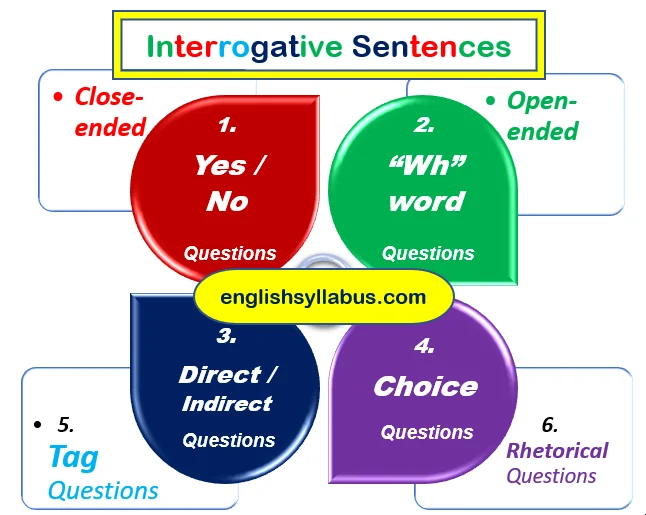
Notice, that all of these sentences end with a question mark. This is a telltale sign of a direct question. Therefore, it is an interrogative sentence.
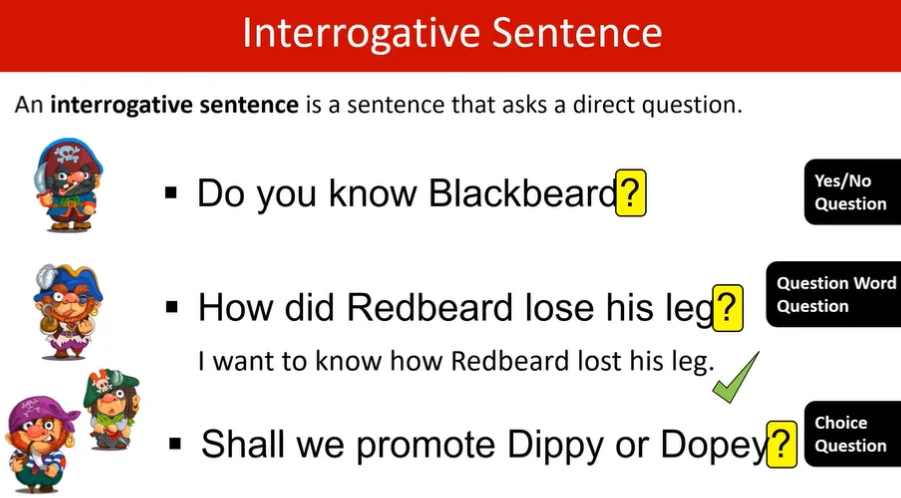
Types of Interrogative Sentences
Yes/No Questions
They are the close-ended questions. But, these types of questions are asked to get answers in affirmation or negatives. So, they are called the Yes/No Questions. For example:
- Let’s answer these questions
- Do you know Blackbeard? Yes/No
- Is Baba expert in letter writing? Yes/No
- Will you like to laugh at me? Yes/No
- Are You working hard these days? Yes/No
- Is your pet blind of an eye? Yes/No
The format of a yes/no question
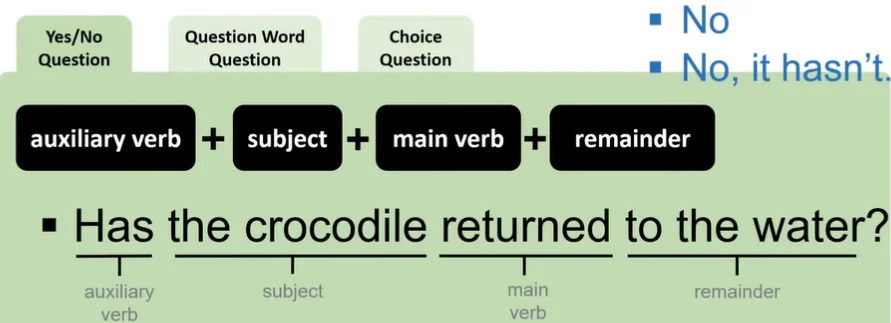
- Auxiliary verb + the subject + the main verb + the remainder
- Can tigers swim well?
- “Can” is our auxiliary verb, “tigers” is the subject (the subject is what the sentence is about) and the “main verb” is swim.
- Has the crocodile returned to the water?
- “Has” is the auxiliary verb “the crocodile” is the subject “returned” is the main verb and “to the water” is the remainder.
Direct vs Indirect Questions
A Direct Question is asked to get specific information or a direct and to-the-point answer. Whereas an Indirect Question is placed within a statement with a lite tone. For example:
| No. | Direct Questions | Indirect Questions |
| 1. | Where is your last photograph? | I am asking where your last photograph is. |
| 2. | Where is the Mall Road? | Can you tell me where Mall Road is? |
| 3. | When is your friend’s birthday? | Do you know when your friend’s birthday is? |
| 4. | How much money do you spend? | Would you tell me how much money you spend? |
| 5. | What is your ultimate wish? | May I know what your ultimate wish is? |
Interrogative Pronouns Questions (The “Wh” words Questions)
These questions start with the “Wh” words. But, they are kind of direct and open-ended questions. So, they are asked to get answers directly from a person.
Here is the list of the question words. This type of “wh” question is known as question word questions because they start with a question word (Interrogative Pronoun).
- What
- When
- Where
- Which
- Who
- Whose
- How much
- Whom
- How
- Why
- How many
Examples of the “Wh” word (Interrogative Sentences) Questions
- How did Redbeard lose his leg?
- When will you invite me at the dinner?
- Where is your briefcase?
- What is your purpose behind these offers.
- Which post is better for me?
- Who is not participating in the ceremony?
- Whose watch has already lost?
- Why are looking so frightened?
The format of “Wh” Question word Question
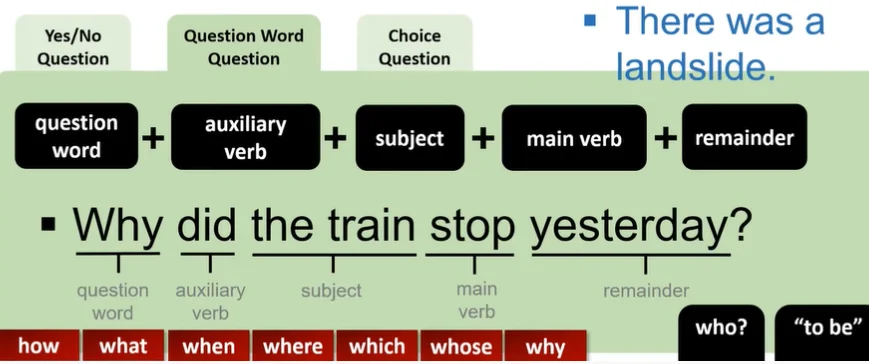
Question word + an auxiliary verb + a subject + a main verb + the remainder.
Why did the train stop yesterday?
“Why” is our question word, “did” is the auxiliary verb, “the train” is the subject, “stop” is the main verb, and “yesterday” is the remainder. But, the answer to a question word question is always information-based.
Choice/ Alternative Questions
Choice questions having more than one option give the reader chance to choose one of them. Overall, they are joined by two sections that are connected with a conjunction “or”. So, the choice questions might be generalized, open-ended questions, or more particular ones. So, this type of question is called a choice question. For example:
- Shall we promote dippy or dopey?
- Are you European or Asian by birth?
- Is your car 🚘 of Suzuki or Honda?
- Will you meet me today or tomorrow?
- Do you support Democrats or Conservatives?
The format of the Choice Question
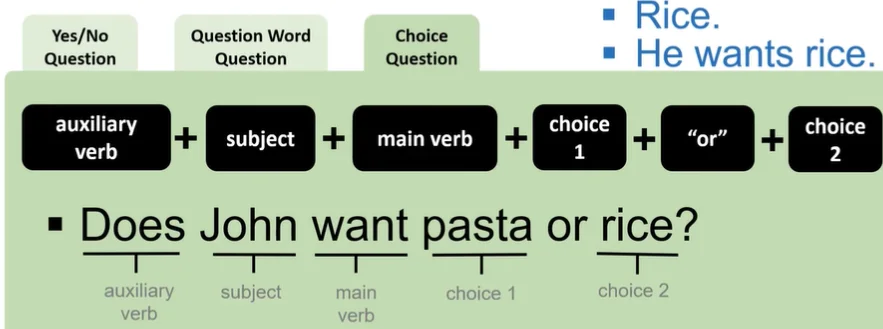
auxiliary verb + subject + main verb + choice one + or + choice two
Does John want pasta or rice?
“Does” is an auxiliary verb “John” is the subject “want” is the main verb and “pasta” is choice; we then have the word “or” and then we have choice number two in this case “rice” is choice two.
Tag Questions
When we anticipate the audience to agree with our message, we frequently employ question tags. We employ a negative question tag in the following examples since the assertion is affirmative.
- They live in a hut, don’t they?
- She is angry officer, isn’t she?
- You’re my soulmate, aren’t you?
- Is this person blind of an eye, isn’t he?
- You’re waiting for me on the bus stand, aren’t you?
Rhetorical Questions
It is a type of question that is used to persuade, make a particular point and express disbelief 🤨. But, it’s not to get an answer rather hooks the readers. So, this kind of question is mostly used in persuasive writing to engage the reader’s willingness to capture his interest.
- Who doesn’t want to be rich?
- ‘If you prick us, do we not bleed?
- Can you believe she tells the lie?
- Can anyone really deny of his/her life after death?
- Who knows not the wonders of the universe?
Types of Sentences
But an interrogative sentence is just one of the sentence types there are four types of sentences. So, we can compare each type with an interrogative sentence. For Example:
- Do you like garlic? Being an interrogative sentence, it is asking a question.
- Tomatoes are red? The second type is a declarative sentence which is used to make a statement.
- Buy two oranges. The third type is an imperative sentence that gives a command.
- I hate onions! And, the fourth type is an exclamatory sentence that expresses emotion.
Now, look at how each of these sentence types ends.
- An interrogative sentence takes a question mark.
- A declarative sentence ends with a full stop.
- An imperative sentence ends either with a period or with an exclamation mark.
- And, an exclamatory sentence takes an exclamation mark in its ending.
Common Mistake with Interrogative Sentences
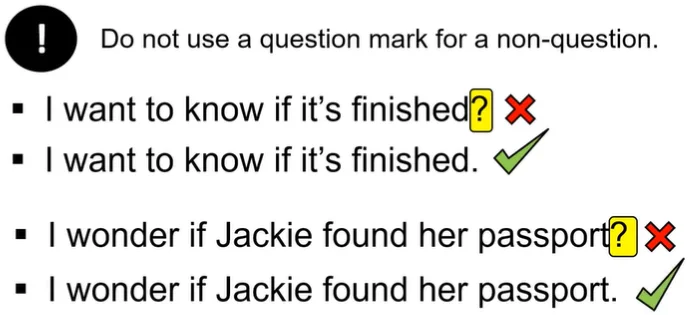
Do not use a question mark for a non-question. For example:
I want to know if it’s finished.
This feels like a question but it’s not a question. This is what’s called an indirect question. But, it should not end with a Question mark. Remember, only direct questions end with question marks. So, this is wrong. Notice that it ends with a full stop or a period.
I wonder if Jackie found her passport.
This is also not a question; this is a statement. Because you are telling people what you are wondering. So, this is correct with a full stop on the end.
